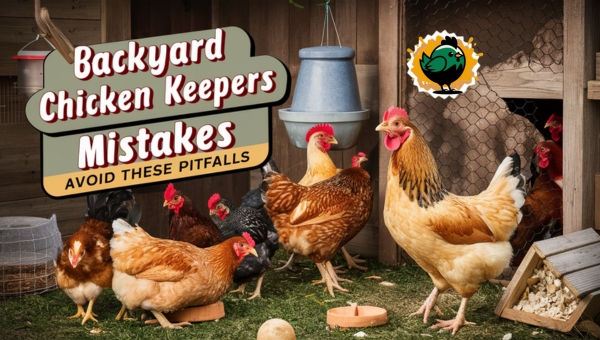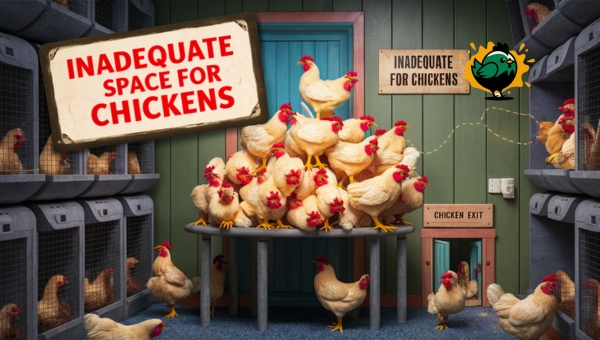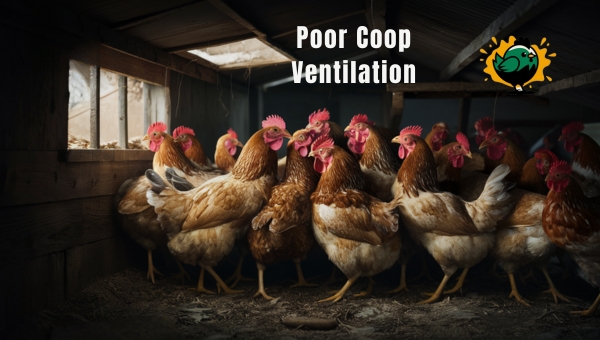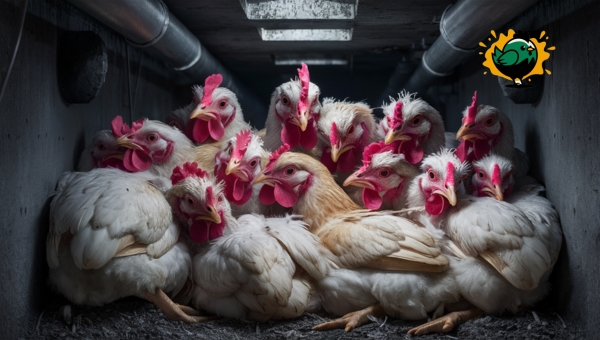Backyard Chicken Keepers Mistakes | Avoid These Pitfalls

Raising chickens in your backyard can be rewarding, but it comes with its challenges. In this article, we’ll explore common mistakes backyard chicken keepers make. From ensuring adequate space to maintaining proper hygiene, we’ll cover it all.
By the end, you’ll have the knowledge to provide a safe and healthy environment for your feathered friends. Let’s dive into these common mistakes and see how you can avoid them to ensure your chickens thrive. Ready to become a top-notch chicken keeper? Let’s get started!
1. Inadequate Space for Chickens
Ensuring your chickens have enough space is crucial. Chickens need sufficient room to move around, stretch their wings, and engage in natural behaviors. Overcrowding can lead to stress, aggressive behavior, and health issues.

Each chicken should have at least 4 square feet of coop space and 10 square feet of outdoor space. It’s important to measure and plan your coop and run with the number of chickens in mind. Adequate space promotes a healthy, happy flock, reducing the likelihood of problems down the line.
2. Poor Coop Ventilation
Ensuring proper ventilation in your chicken coop is crucial for the health of your flock. Without adequate airflow, moisture and ammonia from droppings can build up, leading to respiratory issues and other health problems. Ventilation helps regulate temperature and reduces the risk of disease.

Make sure to have windows or vents that can be adjusted based on the weather. Additionally, placing ventilation openings above the chickens’ roosting area can help prevent drafts while still allowing fresh air circulation. Proper coop maintenance is essential for happy and healthy chickens.
3. Neglecting Predator Proofing
Ensuring your chickens are safe from predators is crucial for any backyard chicken keeper. Common predators include raccoons, foxes, and hawks. A secure coop with sturdy locks and covered runs can make a huge difference.
Additionally, burying the coop’s fencing at least a foot underground helps prevent digging animals from getting in. It’s also wise to check for any gaps or weak spots regularly. Motion sensor lights and secure latches can add an extra layer of protection. Remember, vigilance is key to keeping your flock safe and sound.
4. Inconsistent Feeding and Watering
Ensuring consistent feeding and watering for chickens is crucial. Irregular schedules can lead to malnutrition and dehydration, affecting their overall health and egg production. Chickens thrive on routine, so it’s essential to provide fresh food and clean water daily.
Using automatic feeders and waterers can help maintain consistency. Additionally, monitor the water supply to avoid contamination, which can cause illness. Always check the feed quality to ensure it meets nutritional needs. Remember, consistent care leads to healthier, happier chickens.
5. Introducing New Chickens Without Quarantine
When introducing new chickens to your flock, it’s crucial to quarantine them first. This process helps prevent the spread of diseases that new birds might carry. Quarantine should last at least 30 days in a separate area away from the existing flock.

During this period, observe the new chickens for any signs of illness. Ensure they have their own food and water supply to avoid cross-contamination. Not quarantining new arrivals can lead to severe health problems for your entire flock. Always prioritize the health of your chickens by implementing this essential step.
6. Ignoring Health and Hygiene
Maintaining the health and hygiene of your chickens is vital for their well-being. Regularly inspect your chickens for signs of illness, such as changes in behavior, appetite, or appearance. Clean the coop frequently to prevent the buildup of waste, which can lead to disease.
Ensure that fresh water is always available and that feeding areas remain clean. Additionally, keep an eye out for parasites like mites and lice, and treat them promptly. Proper hygiene practices not only keep your chickens healthy but also contribute to a more pleasant environment for both the birds and their keepers.
7. Neglecting to Provide Proper Perches
Providing proper perches is essential for the well-being of your chickens. Chickens naturally roost at night, and without suitable perches, they may become stressed or develop health issues. Perches should be at least 2-3 inches wide to accommodate their feet comfortably.
Additionally, ensuring the perches are placed at varying heights can help mimic their natural environment. It’s important to clean perches regularly to prevent the buildup of droppings and bacteria. Neglecting this step can lead to foot problems and other health complications for your flock.
8. Not Collecting Eggs Regularly
One common mistake among backyard chicken keepers is not collecting eggs regularly. When eggs are left in the coop, they can attract pests like rodents and insects. Moreover, hens might start eating their own eggs if they see them lying around, which can lead to a bad habit that’s hard to break.
Regular egg collection also ensures that you get the freshest eggs possible. It’s important to note that collecting eggs at least once a day, if not more frequently, helps maintain a clean and healthy coop environment.
9. Overlooking Seasonal Care Needs
Failing to address seasonal care needs is a common mistake among backyard chicken keepers. During winter, chickens require additional insulation and protection from the cold. Summer brings its own challenges, such as ensuring adequate shade and cooling options to prevent heat stress.
Seasonal transitions also mean different feeding needs, like providing more calories in the winter. It’s essential to adjust care routines to match the weather, as neglecting these changes can impact the health and productivity of your flock. Always keep an eye on the forecast and plan accordingly.
10. Underestimating the Time Commitment
One of the common mistakes backyard chicken keepers make is underestimating the time commitment required. Chickens need daily care, including feeding, watering, and cleaning the coop. It’s important to note that neglecting these tasks can lead to health issues and a decrease in egg production.
Assessing your schedule before getting chickens is crucial. Additionally, chickens require regular health checks and occasional veterinary visits. Planning for these commitments ensures your chickens stay healthy and happy. Remember, keeping chickens is not just a hobby; it’s a responsibility.
Conclusion
Understanding the common mistakes backyard chicken keepers make can help you provide a healthier and happier environment for your flock. From ensuring adequate space and proper ventilation to consistent feeding and predator-proofing, each step is crucial.
Moreover, maintaining good hygiene, proper perches, and seasonal care needs can greatly impact the well-being of your chickens. By being mindful of these common pitfalls, you can enjoy the rewarding experience of raising chickens with fewer challenges.
For more insightful tips and guides on backyard chicken keeping, explore our other blogs and enhance your poultry-raising journey!
